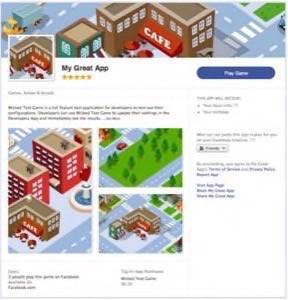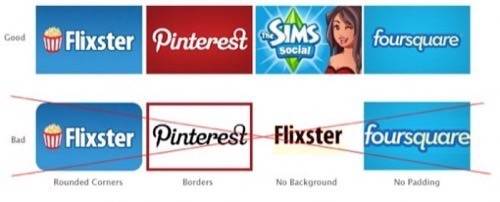
Last September, during the f8 Developers’ Conference, Facebook CTO Bret Taylor said that the company had no plans for a “central app repository” – an app store. Today, Facebook is changing its tune. The social giant has announced App Center, a section of Facebook dedicated to discovering and deploying high-quality apps on the company’s platform. The App Center will push apps to iPhone, Android and the mobile Web, giving Facebook its first true store for mobile app discovery.
The departure from Facebook’s previous company line comes as the social platform ramps up its mobile offerings to make money from its hundreds of millions of mobile users. This is not your father’s app store, though.
Let’s start with the requirements. Facebook has announced a strict set of style and quality guidelines to get apps placed in App Center. Apps that are considered high-quality, as decided by Facebook’s Insights analytics platform, will get prominent placement. Quality is determined by user ratings and app engagement. Apps that receive poor ratings or do not meet Facebook’s quality guidelines won’t be listed.
Whether or not an app is a potential Facebook App Center candidate hinges on several factors. It must
• have a canvas page (a page that sets the app’s permissions on Facebook’s platform)
• be built for iOS, Android or the mobile Web
• use a Facebook Login or be a website that uses a Facebook Login.

Facebook is in a tricky spot with App Center. It will house not only apps that are specifically run through its platform but also iOS and Android apps. Thus it needs to achieve a balance between competition and cooperation with some of the most powerful forces in the tech universe. If an app in App Center requires a download, the download link on the app’s detail page will bring the user to the appropriate app repository, either Apple’s App Store or Android’s Google Play.
One of the more interesting parts of App Center is that Facebook will allow paid apps. This is a huge move for Facebook as it provides a boost to its Credits payment service. One of the benefits of having a store is that whoever controls the store also controls transactions arising from the items in it, whether payments per download or in-app purchases. This will go a long way towards Facebook’s goal of monetizing its mobile presence without relying on advertising.

Developers interested in publishing apps to Facebook’s App Center should take a look at both the guidelines and the tutorial that outlines how to upload the appropriate icons, how to request permissions, how to use Single Sign On (SSO, a requirement for App Center) and the app detail page.
This is a good move for Facebook. It will give the company several avenues to start making money off of mobile but also strengthen its position as one of the backbones of the Web. For instance, App Center is both separate from iOS and Android but also a part of it. Through App Center, Facebook can direct traffic to its apps, monitor who and how users are downloading applications and keep itself at the center of the user experience.
Developers: Are you jumping to deploy an app to App Center? Or is this too little, too late for Facebook? Let us know in the comments.

















